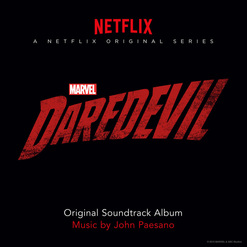
Taking place in the gritty Manhattan neighborhood of Hell's Kitchen, Daredevil is really more of a neo-noir crime drama than a traditional superhero actioner. Part of this is due to the vulnerability of the hero, the blind Matt Murdock who, while gifted with special abilities, still has his work cut out for him when taking down the common criminal. The complexity of the story also works to this end, weaving a complicated tale of back-room politicking, drug-running, and intercontinental mob cooperation. What's more, the show looks beautiful, with every window backlit like a Dario Argento set-piece and every character seemingly carved out of shadows.
What composer John Paesano's score does right is extend this "neo-noir" style into the sonic realm. Broadly speaking, Daredevil shares very few similarities with what we've come to expect from the modern superhero score. Instead of a rousing orchestral palette highlighted by a bold fanfare, it's a grounded, gritty, and intimate thriller score scant on thematics and heavy on ambient electronics. The score's "Main Title" is now pretty recognizable, with descending string ostinatos and pulsating bass underlaying a simple piano theme. Some listeners won't like the score's reliance on electronics, particularly the overwhelming bass, but conceptually it makes a good deal of sense. Drawing on Matt Murdock's arguably "impressionistic" view of "a world on fire", Paesano lets the music explore more textures and rhythms than solid themes. Everything is a little more subtle, and the "shapes" of the recurring motifs are a little less defined. The most recognizable of them, of course, is that "Main Title" theme, but even that theme is reprised infrequently. As Murdock spends the show's first season becoming Daredevil (only wearing the iconic suit in the season finale), Paesano largely holds off on using the main theme until the concluding "Daredevil." Though the heavily-processed orchestra renders it somewhat stunted, it's a sufficiently bold and satisfying reprise after two minor suggestions in "Hallway Fight" and "A World on Fire."
The propulsive rhythm and underlying ostinato riff of the show's "Main Title," however, pervades the score. "Fogwell's Gym" is a punchy, grunge-rock take on it, while the combo of "Stick" and "Wilson Fisk" incorporate the riff into two distinct character motifs, the former a vigorously percussive action piece (with my eternal love, the taiko drums) and the latter a moody atmospheric piece. The score boasts a few more character-attributed cues, such as the subdued but surprisingly moving "Ben Urich," and the more sweeping "Battlin' Jack Murdock." This latter cue initially stands out as one of the more satisfying thematic statements of the score but, as it progresses, it reveals itself to be one of the most egregious examples of "temp-track love" I've seen all year. Indeed, Paesano's "Battlin' Jack Murdock" is a carbon copy of Brian Tyler's "Bangkok Dangerous" (from the film of the same name), replicating almost exactly that cue's opening orchestral movement and muted performance of "Fon's Theme." While the track is nice listening, so is Brian Tyler's.
Paesano's action cues are nondescript and rhythmic, intended to achieve the maximum intensity with the minimum melodic footprint. As a result, the likes of "Hallway Fight," "Passenger Side," "Worthy Opponents," and "The Suit" explore different, pulsating electronics with the occasional wailing guitar, string ostinato, or sustained brass note for variation. The sheer, unrelenting aggression of a cue like "Hallway Fight" accents the scene's impressive choreography well but makes for challenging listening on its own. Outside of "The Suit", which ups the ante for the score's action writing and toys with some of its motifs, listeners will either take or leave Paesano's action cues.
While the main theme might underwhelm at first, it grows on you with repeated listening. I think the same can be said for the score as a whole, though fans of the show will undoubtedly be better equipped to sift through its grungy soundscapes. Daredevil is excellent, mature entertainment, and worth viewing if only to better appreciate this darker, more subdued take on the modern superhero score. Composer John Paesano does a decent job of accenting the more noir-ish traits of Marvel's Netflix debut, but his score is not for everyone. When it's not blatantly plagiarizing from Brian Tyler's Bangkok Dangerous, though, I can mostly dig it.
|
A Few Recommended Tracks: "Main Title," "Fogwell's Gym," "Battlin' Jack Murdock" (though it's originality is in question), "Ben Urich," "Daredevil" Label: MARVEL and ABC Studios Availability: 15-track edition |
|

 RSS Feed
RSS Feed
